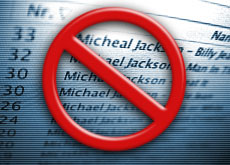Music industry calls time on illegal downloading

Swiss record producers have launched a campaign to stamp out the illegal downloading of music on the internet.
Individuals who exchange music samples and collections on the web are being warned that they could face prison sentences and fines of up to SFr100,000 ($77,000).
The Swiss branch of the International Federation of the Phonographic Industry (IFPI) – which represents the interests of 90 per cent of record labels in Switzerland – says it will do everything in its power to curb the illegal trade in music on the web.
Peter Vosseler, director of IFPI Switzerland, said the industry would no longer hesitate to prosecute those accused of illegally downloading or putting music online without the permission of record labels and artists.
“The threat of legal action comes only after a period when we have tried to educate and inform the public that this is not allowed,” Vosseler told swissinfo.
“The problem of illegal downloading in Switzerland is similar to that of other countries and needs to be dealt with now before it gets worse… we have to stop it because the damage these individuals are causing is enormous.”
Struggling to survive
Vosseler argues that internet piracy is a blow to Swiss solo artists and bands, many of whom sing in dialect and are rarely able to make a name for themselves outside the country.
The vast majority even struggle to make a living from album sales on the domestic market.
“Of course it’s not only Swiss artists but all performers who are suffering,” he said.
The primary target of the new campaign will be individuals who upload music on to the web without permission.
“These people are more often than not downloading [music] as well, so what we are seeing is the copying of music without any remuneration for the artists or producers. It’s time now to stop all these illegal activities – it is time to pay for music again.”
Facing prosecution
Under Swiss law anyone found guilty of engaging in the illegal trade of music online can be prosecuted and face thousands of francs in fines.
“Under the terms of the [1993] Swiss Copyright Act, those caught [could be hit with] fines of up to SFr100,000 and imprisonment for up to three years,” warned Vosseler.
“Of course in an average case the sentences are unlikely to be as harsh as this, but we are talking about fines of between several hundred and several thousand francs.”
The threat of prosecution comes in the same month that the global music industry announced a 7.6 per cent fall in sales last year to $32 billion (SFr41 billion) – the steepest decline since the arrival of the compact disc.
The Swiss music industry fared even worse, registering a 15 per cent decline in sales in 2003.
The IFPI blames the slump in retail music sales on piracy, as well as poor economic conditions and competition from video games and DVDs.
Record companies are being forced to save money by ditching loss-making artists and cutting staff. Two weeks ago EMI – the world’s largest independent music label – announced plans to axe 20 per cent of its global workforce with the loss of around 1,500 jobs.
Blame game
Industry insiders maintain that unauthorised downloading is at least partly to blame for the fall in sales.
“We are losing ground when it comes to selling music,” admitted Vosseler.
“There may be many reasons for this, but for sure one of them is that private individuals are downloading music for free, instead of buying it for themselves.”
But critics argue that the music industry has only itself to blame for failing to curb the spread of internet downloading activities.
“To a large extent the music industry can only point the finger at itself,” said Dieter Gorny, founder of music television station Viva, in a recent interview with the Zurich-based “Tages-Anzeiger” newspaper.
“It has failed to keep up with the pace of change in the past few years.”
Exaggerated fear?
A report published last month in the United States concluded that music downloads had no significant impact on record company profits.
The survey – jointly carried out by researchers from Harvard and North Carolina Universities – blamed declining sales on a “reduction in music variety” and a consumer backlash against the music industry.
But Vosseler warns that if nothing is done to stamp out the free-for-all electronic trade in music, consumers will lose out as less revenue is generated to invest in and nurture new musical talent.
“In the end the damage done [by downloading] will be felt by artists and producers. But the consumer will suffer as well, as the available repertoire starts to shrink…and as record companies take fewer financial risks on productions.”
swissinfo, Ramsey Zarifeh
Founded in 1933, the Zurich-based IFPI represents the global recording industry and is made up of 1,500 record producers and distributors in 76 countries.
It also has national groups in 46 countries, including Switzerland.
The IFPI aims to fight music piracy and assist in the development of technologies to help the recording industry adapt to the digital age.

In compliance with the JTI standards
More: SWI swissinfo.ch certified by the Journalism Trust Initiative


You can find an overview of ongoing debates with our journalists here. Please join us!
If you want to start a conversation about a topic raised in this article or want to report factual errors, email us at english@swissinfo.ch.